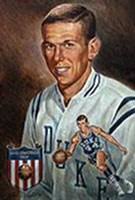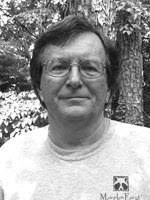The NBA Finals date back to 1947 (when they were known as the Basketball Association of America Finals) and the very 1st NCAA tourney was held in 1939. Olympic basketball competition is even older: it debuted as a demonstration event in 1904 and the men’s version became a medal sport in 1936, with the women finally getting their chance to go for the gold in 1976. The United States has dominated Olympic basketball competition from the start: the men have won 16 gold medals in the 19 tournaments they have participated in during the past 85 years, while the women have won 9 gold medals in the 11 tournaments in which they have competed during the past 45 years. HoopsHD’s Jon Teitel continues his coverage by chatting with Jim Sumner (columnist for Go Duke: The Magazine and Duke Basketball Report) about Jeff Mullins making back-to-back Final 4s and winning a gold medal.
Mullins is 1 of many Olympic gold medalists born in Queens (including Bob Beamon/Vincent Matthews/Al Oerter) and went to high school 2 miles from the Kentucky campus in Lexington (where his wife Candy became a cheerleader): what the heck did they put in the water in Astoria, and what made him choose Duke? His father worked for IBM and the family moved to Lexington when Mullins was in high school. He went to high school there for at least two years, maybe three, but did not grow up dreaming of playing for Adolph Rupp. Mullins had a high school teammate in Lexington named Jon Speaks. Rupp came to practice 1 day and offered Speaks a scholarship. Speaks asked for a day or two to think about it and Rupp got upset and pulled the offer. Mullins saw a side of Rupp that he did not like. Speaks ended up as an All-ACC guard at NC State but died tragically in an automobile accident in 1963. Coach Vic Bubas was just starting to establish his program at Duke. He had to convince Mullins that he could coexist with Art Heyman, who was a year ahead of Mullins. Bubas told Mullins that Heyman was a willing and skilled passer and he was correct. Mullins averaged over 20 PPG in the two seasons that he and Heyman played together.
In the 1963 NCAA 3rd place game he had 14 PTS/10 REB in a win over Oregon State: how did that tourney run in 1963 help the team prepare for another great effort in 1964? Heyman was a senior in 1963 and won all of the national POY awards so I do not think there was any wait-until-next-year attitude. Duke went into the 1963 Final Four on a 20-game winning streak and expected to win it all. That said, starters Mullins/Jay Buckley/Buzzy Harrison returned as seniors in 1964, and top reserves Hack Tison/Denny Ferguson moved into starting roles as juniors. So, it was a veteran team that was coming off of Duke’s first Final Four season.
Take me through the 1964 NCAA tourney:
In his opening game on Friday the 13th he scored 43 PTS/19-28 FG and had 12 REB in a win over Villanova (including a 45-footer to end the 1st half): was it just 1 of those scenarios where ever shot he put up seemed to go in because he was “in the zone”? The NCAA Tournament was not seeded in those days. Duke was ranked third and Villanova was seventh in the AP poll. They matched up in an East Region semifinal but everyone knew that this was the title game. Villanova started two players (Wally Jones and Jim Washington) who would become longtime NBA starters and a 3rd (Bill Melchionni) who would become an ABA star. As an aside, Melchionni’s younger brother Gary/nephew Lee both later played at Duke. Villanova’s leading scorer was a 6’4” forward named Richie Moore. Mullins grabbed 12 REB and held Moore to 8 PTS (10 below his average) and forced him into 5 turnovers. That half-court shot gave him 28 PTS by halftime and put Duke up 49-33 at the half. A great player rising to the occasion with a great all-around game.
In the title game he scored a team-high 22 PTS in a loss to UCLA: how close did they come to ruining the Bruins’ undefeated season? After the Villanova game Duke beat Connecticut by 47 PTS in the East Region finals. Duke was then matched against a great Michigan team featuring two All-Americans in Cazzie Russell and Bill Buntin. Michigan had embarrassed Duke 83-67 earlier in the season at Ann Arbor and Duke really wanted revenge. Russell was the best player on the court (31 PTS/13-19 FG) and Mullins was pretty good (21 PTS/8 REB). However, the 6’10” Buckley outplayed Buntin in the best game of his career with 25 PTS/14 REB as Duke won 91-80. In the other semifinal Kansas State led undefeated and top-ranked UCLA much of the game before falling at the end. The Duke players saw part of that game but not UCLA’s comeback because the coaches wanted to get them some rest. Remember that the Final Four was held on Friday/Saturday in those days. Duke had expended a lot of physical/emotional energy in beating a talented and really physical Michigan team so there was not much time for them to recover/prepare for a UCLA team that thrived on its zone press. Duke led UCLA 30-27 in the first half when they let down their guard. UCLA’s press forced some live-ball turnovers, which they turned into layups. The lapse only lasted a few minutes but before Duke regained its composure UCLA had run off a 15-0 burst and turned that 3-PT deficit into a 12-PT lead. Duke never again got closer than 8 PTS. It is hard to argue the results of an undefeated team winning the national title game by 15 PTS.
As a senior in 1964 he was named All-American/ACC Athlete of the Year/MVP of the NCAA Eastern Regionals: what did it mean to him to receive such outstanding honors? As good as Mullins was in 1962/1963 (and he was very good), Heyman still got the lion’s share of acclaim. Mullins proved that he could carry a team in 1964: not by himself of course, but he was the undisputed star on a Duke team that went further than any other Duke team up until that time.
He scored 21.9 PPG during his college career and had double figures in each of his 86 games: what was his secret for being a great scorer? He was very versatile and a great shooter: he could score in transition, get to the line, and then convert from there. He also averaged 9 RPG at Duke, which was pretty good for a 6’4” 185-pounder. He was known for his ability to use the backboard and was a very creative scorer.
That fall as a member of team USA he missed the 73-59 win over the USSR in the final with a knee injury: what did it mean to him to win a gold medal despite not getting to play the last game? He obviously would have liked to have been healthy.
He was named an All-Star 3 straight years from 1969-1971 and helped Golden State win an NBA title in 1975 by sweeping Washington: how do you view his pro success as compared to his college success? Mullins probably never gained the recognition he deserved for his NBA career. He was not on national TV very much and the Lakers absorbed what little attention the West Coast got from the Eastern media. His teammate Rick Barry was better and certainly flashier and Mullins was on the downside of his career by 1975 as a role player. For seven seasons or so he absolutely was one of the NBA’s best guards and had some great playoff performances…only they took place in the middle of the night on the East Coast and were not really publicized.
In 1985 he was hired as head coach/athletic director at Charlotte, where he set a school record with 182 wins over 11 seasons and made 3 NCAA tourneys: why did he get into coaching, and what did he learn from College Basketball Hall of Fame coach Vic Bubas about how to succeed on the sideline? Bubas was known for two things: recruiting and organization. UNC-Charlotte caught lightning in a bottle in 1977 with Cornbread Maxwell and Lew Massey but they never really had the resources to recruit against the ACC. Mullins was an outstanding coach and teacher.
His #44 jersey was retired in 1994 and in 2002 he was named as 1 of the 50 greatest players in ACC history: when people look back on his career, how do you think that he should be remembered the most? Along with Art Heyman, Mullins was a key part of Duke’s first truly great teams and deserves all of the honors that he has received.


